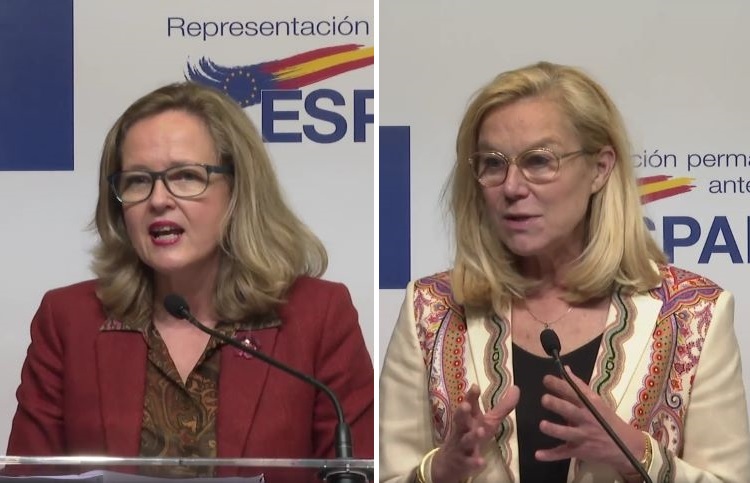The Diplomat
The Spanish government has once again joined forces with that of the Netherlands, its fiercest rival during discussions on the European Recovery Fund or on energy market rules, to present a proposal to reform European fiscal rules in order to make fiscal consolidation compatible with economic growth and increased investment.
“We have to address and move forward on debates that are strategic and structural for the future and, in particular, we have to move towards a framework of fiscal rules that responds to the current needs and challenges for the future of all our economies,” said yesterday the First Vice-President of the Government and Minister of Economic Affairs, Nadia Calviño, during a meeting with the press in Luxembourg before participating in the Eurogroup meeting and meeting with the Minister of Finance of the Netherlands, Sigrid Kaag.
The Netherlands – the most “frugal” of the so-called “frugal countries” – had historically opposed any reform of European fiscal rules, and although its government recently accepted the possibility of introducing changes to the Stability Pact – in a joint letter with Austria, the Nordic countries, the Czech Republic, Slovakia and Latvia – it remained firm in its rejection of a reform as ambitious and profound as the one proposed by countries such as Spain, France or Italy.
However, after the meeting held last week in Madrid between the President of the Government, Pedro Sánchez, and the Dutch Prime Minister, Mark Rutte, Spain and the Netherlands, two countries that “have traditionally had very different positions” regarding fiscal rules -in Nadia Calviño’s words-, presented yesterday in Luxembourg a joint proposal (a non-paper) that was read by Calviño and Kaag in a joint press conference.
“In a context of high debt levels, Member States should credibly commit to building fiscal buffers to be prepared for the next crisis through country-specific consolidation strategies that are realistic and gradual, but also ambitious, as well as compatible with economic growth and job creation,” warns the document, which therefore encompasses the usual requests from the Netherlands in favor of “efficient” fiscal sustainability with Spanish proposals so that the specific budgetary paths for each country are realistic and do not impede GDP growth.
The document proposes the elimination of the current fiscal rule – which provides for a set annual reduction in debt until the maximum target of 60% of GDP is reached – to give euro zone governments room to increase public spending and create fiscal buffers to enable them to cope with the crisis. The text also calls for the creation of “clear safeguards so that the Commission and the Council can act in the event that any country fails to comply with the consolidation path established”.
The proposal also calls for the replacement of “medium-term objectives” for fiscal consolidation in favor of a “simple expenditure rule” that would be “more comprehensible, easier to implement and counter-cyclical” and would include “escape clauses” that would allow the rules to be suspended in the event of “extraordinary events” beyond the control of governments. It also believes that the new fiscal framework “should take into account the huge investment effort” that the EU must undertake to drive the digital and ecological transitions, the latter of which is “crucial” to reduce dependence on fossil fuels from Russia.
The Stability and Growth Pact – which sets limits on public debt and deficits for all EU countries – has been suspended since the start of the pandemic and, in principle, these budgetary rules are expected to remain suspended in 2022. The deactivation of the Escape clause of the Stability and Growth Pact is scheduled for 2023, but the Urania war and its economic consequences have opened the debate on the possibility of maintaining it next year.
Partners and rivals
Spain and the Netherlands have maintained important differences in the face of major challenges in recent years, especially during negotiations on the European recovery fund following COVID-19 and on the Spanish proposal for a levy on energy prices and the decoupling of gas and electricity prices. However, these differences did not prevent Pedro Sánchez and Mark Rutte, in March 2021, from presenting a proposal for European strategic technological and health autonomy, “without isolationism or protectionism”, nor did they prevent the two governments from agreeing, on this occasion, to propose reforms to European fiscal rules.
During the reading of the 16th Charles of Antwerp Memorial Lecture, the Dutch Prime Minister assured last week in Madrid that “Spain and the Netherlands are partners firmly rooted in Europe, but they also have a very broad vision of the world, and although we may not agree on everything, when it comes to crucial issues we are very much in agreement”. He also defended “structural reforms” to make the European economy “stronger and more resilient” and advanced some of the general lines of the document presented in Luxembourg: “We can give countries more time to reduce their debt if we see that they are strengthening their economies”, for which “supervision by the European Commission to make sure that countries comply with the agreements” is very important. For his part, Pedro Sánchez stated in the presentation of the same event that, “when Spain and the Netherlands are able to reach an agreement on some issue, the EU as a whole is closer to reaching an agreement on this issue”. He also urged to “change stereotypes and preconceived ideas, such as the idea that the countries of northern and southern Europe have antagonistic visions of life”.





